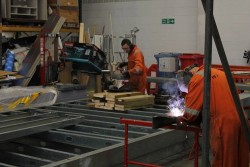An increasing number of technological advances may help with the growing housing shortage.
Traditional funding models, a shortage of skilled workers, the availability and affordability of land, shortfalls of building materials, a 'we've always done it this way' mentality and even the Great British weather - these are just some of the challenges we face as a sector in helping the UK solve its growing housing crisis.
Social housing providers are making real strides in maximising housebuilding programmes. The planned merger of Severn Vale will see us join the Bromford Merlin partnership in January. This has already committed to building 14,000 new homes over the next decade, half of which will be in Gloucestershire.
This will undoubtedly make massive inroads into providing affordable homes for those who need them. However, it is only one part of the solution.
Following a meeting of the Gloucestershire Homes and Community Partnership, in which seven social housing providers discussed how we can all assist in providing more much-needed affordable housing across the South West, we began researching modular housing with the support of Bromford chief executive designate Robert Nettleton.
Coming from a traditional construction background, I have no qualms in admitting there was an element of scepticism as we set about visiting six factories in and around London to see the offsite construction process in detail.
Since then, in my role at Severn Vale, we have worked closely with a company called Totally Modular.
It, like Bromford, believes in doing things a little differently and manufactures homes in its factory in the West Midlands. Our aim was to create a 'South West model' house type that offers a genuinely affordable offsite option for social housing for less than £100,000.
Around 18 months on from those initial discussions, it is fair to say my preconceptions have been banished, as we recently exhibited a number of bespoke designs at the Bristol Housing Festival that have a starting cost of £99,000 per unit (£1,350/m2) excluding grant funding.
Working with partners such as Puredrive Energy and Daikin, we've maximised the level of innovation by including solar photovoltaic battery storage, ground and air source heat pumps, and electric heating systems within the fabric of the building. This will ensure that our customers of the future benefit from far lower energy running costs and keep more pounds in their pockets as a result.
Model building
The South West model house is constructed in stages at the factory before being transported directly to the site, where it is then secured using a combination of specialist steels. The range of external finishes include brickwork, render or cladding, which are mechanically fixed to the modules during the factory manufacturing process, achieving very high standards. In total, 97% of the home arrives on site already fitted with kitchen, bathroom, windows, doors, and internal and external wall finishes - all completed in this clean factory setting, rather than on the site, as has traditionally been done.
Puredrive Energy was the first company in the market to produce a combined battery and solar storage system able to achieve a fast frequency response through its 'one box' solution. This can lower energy bills for homeowners and small and medium-sized businesses, as it can be hooked up to a virtual power plant, meaning customers can in effect buy and sell energy within their own community and generate revenues from an evolving energy supply chain market.
Several families have been trialling this digital technology in Tewkesbury for the past 12 months and the results have been extremely positive, with savings of up to 60% from their electricity bills. These savings now go towards gas consumption and one could well imagine that using this technology, we could see a future where fuel poverty is greatly reduced, if not completely eradicated - not just for the pilot families in Gloucestershire but potentially thousands or tens of thousands of other families.
Perhaps the starkest difference to traditional methods is the time it takes from start to finish to construct a modular home. Nine people can turn around a high-spec family home in just 10 days, with all the quality control tests and checks carried out in the controlled environment of the factory floor. This ensures that when it leaves for its final destination, it is ready for occupancy.
This process has the scope to redefine and rejuvenate not just the construction industry but also UK engineering.
New thinking
There is a long road ahead. One of the biggest challenges will be shifting mindsets to welcome in a world where offsite housing methods sit alongside the traditional methods that have existed for hundreds of years.
It is thinking that will form part of the discussions as Severn Vale joins Bromford in the new year. Imagine, for example, how much more quickly and efficiently we could provide people with a home if the affordable element of a Section 106 site was dedicated to both traditional and modular builds - customers could be given a safe and secure home in weeks, rather than months, leading to savings in other vital areas and services.
On a similar theme, it doesn't have to stop there when it comes to the innovation in our homes. Technology now exists to offer far earlier support and intervention when customers, particularly more vulnerable people, are living in our homes. Incorporating this into an offsite concept could realistically assist organisations such as the NHS in their efforts to tackle avoidable hospital admissions, bed-blocking and other things that are high on the public agenda.
The potential is there. Now we just have to convince people to come along and join us on our journey.
Michael Craggs, asset and commercial director, Severn Vale Housing
Original link - Inside Housing








